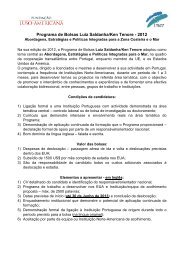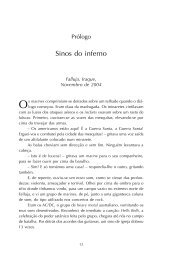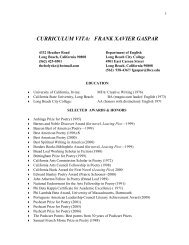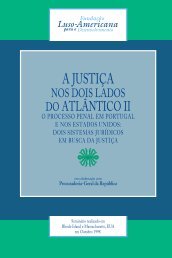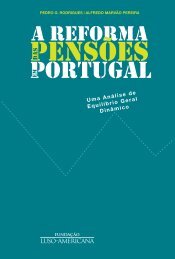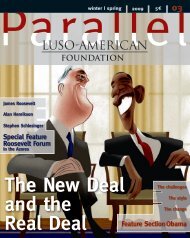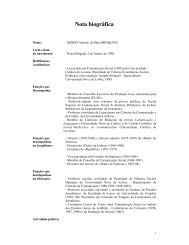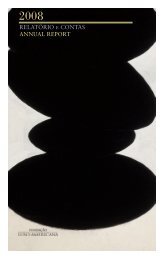A decade later - Fundação Luso-Americana
A decade later - Fundação Luso-Americana
A decade later - Fundação Luso-Americana
You also want an ePaper? Increase the reach of your titles
YUMPU automatically turns print PDFs into web optimized ePapers that Google loves.
They publish materials, but they don’t do<br />
a very good job of communicating. So, she<br />
identified this area and said, “What if I<br />
were to become the publisher of the material<br />
you want to publish, and I will put out<br />
a publication called University Parents?”<br />
The idea was so successful that she took<br />
it beyond the universities. I think today<br />
she has about a 160 contracts with universities.<br />
And she did it with very little<br />
capital.<br />
[P] How do you conciliate entrepreneurship with<br />
sustainability?<br />
[PJ] The way we got there is by having<br />
several years of being acknowledged as a<br />
leading entrepreneurship education program.<br />
So we we really needed to think<br />
about the direction the future is moving<br />
in. What we discovered was that increasingly,<br />
consumers were changing the way<br />
they did business in order to become<br />
more sustainable. And as entrepreneurs<br />
always do, we looked at fundamental<br />
changes. When corporations change direction<br />
– even slightly – it creates opportunities<br />
for entrepreneurs, because the large<br />
companies will need new solutions.<br />
[P] Are there differences in teaching Portuguese<br />
and Americans to take risks?<br />
[PJ] I think there are many differences. As<br />
I think of Portugal’s history, it’s one of the<br />
most risk-oriented, entrepreneurial cases<br />
of how to take advantage of new opportunities.<br />
It’s in the water; it’s in your DNA<br />
here in Portugal. It seems to be an anomaly<br />
to me, actually, as I learn more about<br />
the country.<br />
I would say several things are very different,<br />
and I’m not an economist, and I’m<br />
not a government politician, so I’m<br />
observing some of this from a distance.<br />
Because most entrepreneurs tend to be<br />
very apolitical. We’re on the ground creating<br />
businesses. And we have an environ-<br />
socieTy<br />
ment that enables us to adapt, that<br />
changes when you go into regulated<br />
industries. So energy, and many other<br />
things increasingly help you innovate, and<br />
the answers you find are becoming more<br />
important for coming generations in the<br />
US. So it is all very dynamic.<br />
What are the differences then? The first<br />
thing I always say is that one should never<br />
think of the US as lockstep. There are areas<br />
in the US that are very entrepreneurial.<br />
We happened to be in one of those areas,<br />
so it was part of our culture. However,<br />
there are many areas of the US that are<br />
not entrepreneurial at all.<br />
But the similarities happen at the state<br />
level. We all know what California has<br />
done. You must have leadership with a<br />
plan, a leadership that sets the stage so<br />
that businesses can operate with confidence.<br />
This makes all the difference in the<br />
world. We have that in Colorado. So the<br />
differences are that we can’t do it at the<br />
federal level. I think Portugal has a chance<br />
to be much more effective in setting<br />
policies at the federal level.<br />
[P] Do you have to be out of your mind or have<br />
a screw loose to be a leader? Or be emotional<br />
and impulsive? And what about the Unreasonable<br />
Institute?<br />
[PJ] Absolutely, yeah. [laughs]. Human<br />
nature tends to resist change. There’s a<br />
defining characteristic in entrepreneurs,<br />
it’s that they seek; they live within the<br />
threshold of the unreasonable. I know I<br />
do. I believe that if you are not changing,<br />
you are falling behind, because the world<br />
is changing. It’s changing (tapping on the<br />
table) every single second. Anybody who<br />
wants to maintain the status quo is falling<br />
behind, because the world is moving fast.<br />
There’s always a better way; there’s always<br />
a different way; always a new opportunity.<br />
There’s always a change that can be<br />
identified, embraced, and somehow taken<br />
advantage of.<br />
Entrepreneurs take risks that most people<br />
won’t take, and then immediately set to<br />
work on reducing those risks. They don’t<br />
like to live in a constant state of risk, but<br />
they have the skills. And this brings us to<br />
education. If you can teach someone to<br />
understand how to evaluate a risk and<br />
what things need to be considered to<br />
reduce that risk, then you can put them<br />
in a position where they can feel comfortable<br />
and say, “This is a reasonable risk to<br />
take, I guess. I’m not being unreasonable<br />
in taking it, because there’s a reasonable<br />
chance I can overcome the remaining<br />
risks. And if I can do that, then I will learn<br />
from it.”<br />
*with André Sebastião<br />
About the center<br />
for entrepreneurship<br />
education in portugal<br />
The Center for Entrepreneurship Education<br />
in Portugal (CEEP) is a not‑for‑profit asso‑<br />
ciation of individuals, educational organi‑<br />
zations, companies, government entities<br />
and civil society organizations. The mis‑<br />
sion of CEEP is to help in the development<br />
and implementation of national programs<br />
in entrepreneurship education and training<br />
through research projects, education,<br />
training, and public policy development.<br />
CEEP was created in 2010 through agree‑<br />
ments with various national entities<br />
including: Universidade de Lisboa,<br />
Universidade Católica Portuguesa, Centro<br />
Regional do Porto, Universidade do<br />
Algarve and ISCTE‑Audax – Centro de<br />
Investigação e Apoio ao Empreendedorismo<br />
e Empresas Familiares.<br />
Parallel no. 6 | FALL | WINTER 2011 51



